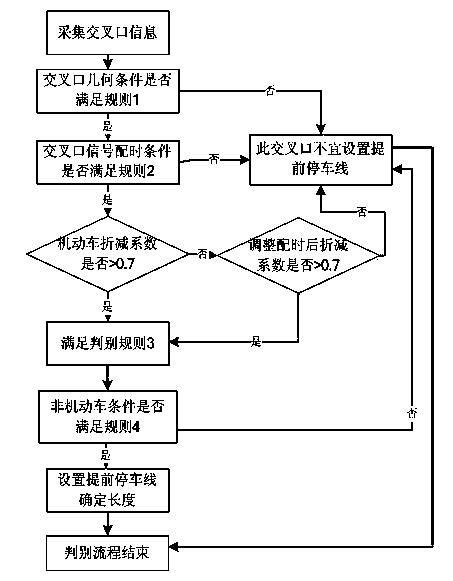Method for arranging non-motor vehicle stop-in-advance line at two-phase signal-controlled intersection
A non-motor vehicle and phase signal technology, which is applied in traffic signals, traffic flow detection, roads, etc., can solve the problems of reducing the travel time of residents, and the conflict between motor vehicles and non-motor vehicles is relatively large, so as to improve the comprehensive traffic efficiency and ensure Priority of way, the effect of reducing conflict
- Summary
- Abstract
- Description
- Claims
- Application Information
AI Technical Summary
Problems solved by technology
Method used
Image
Examples
Embodiment Construction
[0035] The present invention is described further below, and the two-phase intersection non-motor vehicle advances the parking line setting method and comprises the steps:
[0036] 1) Collect the initial signal timing information, road geometry information, traffic flow information and operation information of the intersection signal lights for urban intersections:
[0037] On the road section where the machine is not mixed and the mutual influence is serious, the signal timing status (including cycle duration, phase number, green light time, yellow light time and green light interval time of each phase) and geometric conditions ( Intersection area, length, number of road lanes) real-time monitoring and recording traffic flow information (mainly motor vehicle, non-motor vehicle flow). In this patent example intersection, the initial signal timing information, road information, and traffic flow information can be obtained by field surveys and can also be collected by camera met...
PUM
 Login to View More
Login to View More Abstract
Description
Claims
Application Information
 Login to View More
Login to View More - R&D
- Intellectual Property
- Life Sciences
- Materials
- Tech Scout
- Unparalleled Data Quality
- Higher Quality Content
- 60% Fewer Hallucinations
Browse by: Latest US Patents, China's latest patents, Technical Efficacy Thesaurus, Application Domain, Technology Topic, Popular Technical Reports.
© 2025 PatSnap. All rights reserved.Legal|Privacy policy|Modern Slavery Act Transparency Statement|Sitemap|About US| Contact US: help@patsnap.com



